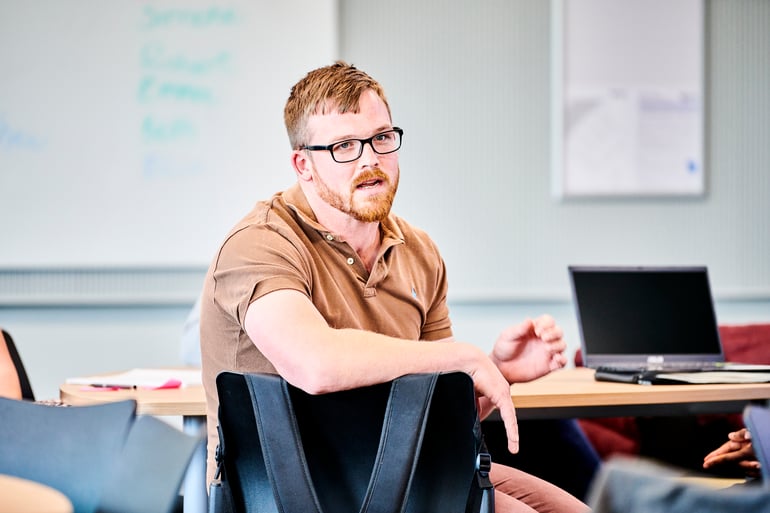Leaders practicing allyship - what's all the fuss about?
11 July 2023 | By: Newcastle University | 4 min read
Allyship is a key component in fostering trust within a personal or professional relationship – but how do you know if you’re being an ally to your colleagues? Newcastle University’s leadership experts Dr Nicola Patterson and Professor Sharon Mavin answer the burning questions on how to be an ally in the workplace.
Contents:
-
What is allyship?
-
Why do people become allies?
-
How to be an ally in the workplace:
-
What actions can an ally take?
-
What can leaders do to support allyship?
-
What leadership courses would you recommend?
Amidst the ‘Great Resignation’, the ‘Great Breakup’, the ‘War for Talent’, and the challenges of multigenerational and diverse generations in the future of work, there is an increasing need to put people back at the centre of organisations and to rebalance where power lies. There is a growing conversation about inclusive leadership, with one area focusing on who is an ally and how to practice allyship.
However, an ally is not an identity that you have. ‘Allyship is about the actions you take’ (NHS Ally toolkit).

Being an ally is simple and complicated at the same time.
Allyship is where people in an advantaged group recognise their privilege and work with those who are in oppressed groups to dismantle barriers, obstacles and systems which give the advantaged group power. According to the NHS Ally toolkit:
"Allied behaviour means taking intentional, overt and consistent responsibility for the changes we know are needed in our society and does so in a way that facilitates the empowerment of persons targeted by oppression."
What is allyship?
The Boston Consulting Group (BCG) view an ally as someone who actively questions, rejects, and combats exclusionary ideology and works against oppression. Allies support and advocate for populations and communities of which they are not a part, using their power and privilege to uplift others.
Why do people become allies?
There are several motivations for becoming an ally. For many people, the motivation is an emotional connection. For example, allies:
- recognise their own privilege
- recognise what it’s like to be part of an outgroup
- have a sense of injustice
- feel it’s the right thing to do
- are often parents of girls
- feel it would help their connections to others
- feel it would make them a better leader

How to be an ally in the workplace:
If you are putting effort into becoming an ally or better ally, there are some questions you might want to consider:
- Do you know what obstacles exist in your organisation for under-represented colleagues? Are you interested in helping to remove them?
- Do you know whose voices are not represented in your organisation today? Are you interested in how you can contribute to creating a culture that allows these voices to thrive?
- Are you interested in educating yourself and engaging with becoming an ally?
- Are you interested in what behaviours you should practice publicly to foster an ally culture in your organisation?
What actions can an ally take?
The discussions we have on our leadership programmes, coupled with research and policy papers, have included the following examples of being an ally as working positively for leaders who are allies:
- Listen to those groups who are not in the majority. What change do they want to see?
- Recognise that it’s not up to the minority to make the change – it’s up to the majority.
- Recognise and talk about how using the same policies and processes that have not delivered inclusion will mean you won’t deliver inclusion in the future! – take action to lead on structural change through review, dismantling and reformulating.
- Be aware and talk with others - about power - in your team, in your organisation - who has it, who doesn’t have it and how to share it around.
- Be conscious of who is ‘in the room’ and who is missing and take action to change this. Focus on the collective – everyone’s ‘in’ (not some in and some out).

- Lead by example in creating a welcoming environment in any setting (meeting, workshop, briefing etc.) so that individuals feel included, welcome and that they belong.
- Chair meetings differently and attend meetings differently, and with a high sense of self-awareness and consciousness to patterns of ‘how we do things here’. Learn to read the nuances of conversations, become aware of how interactions happen in your teams, watch-listen and see systems of oppression happening where you didn’t see them before.
- Be aware of how often you go to men first when referring to people or when introducing people or when asking people to introduce themselves or to present.
- Always give credit to those who are in the minority in any space, for their ideas and contributions. Watch out for those who take others’ ideas as their own or speak over others.
- Have the courage and be prepared to ask for a discussion with someone who behaves or speaks in ways you feel are inappropriate or where you see bias. Talk through why an alternative would be more helpful.
- Have the courage and be prepared to face the ‘backlash’ from those who are in the majority who feel they are losing their power, don’t know enough, or are feeling out of their comfort zone, by having a constructive dialogue. Talk openly about backlash and constructively about why people may be feeling the way they are. Have brave conversations.
- Review the ways that high-profile work is allocated and advocate for those in the minority to be involved in high-profile projects and tasks, to be offered opportunities, and to be promoted.
- Require diverse shortlists for selected positions or opportunities and be prepared to cancel selection events when shortlists only include those in the majority and hold teams accountable.

What can leaders do to support allyship?
Leaders can develop an approach to inclusion which puts people at the heart of their leadership practice where they can develop stronger connections with others.
In our leadership programmes, we develop inclusive leadership which supports you to develop your skills in organisational contexts.
- Through learning approaches, we introduce you to ways you can raise your awareness of power and privilege, of social identities, and how you can challenge your assumptions and biases to develop inclusive approaches to your leadership practice.
- We consider the challenges that women leaders and those with minority identities can face and discuss ways you can be a leader ally (such as those above).
- We focus on the significant changes in work and society and ask you to consider wicked problems, such as racial and gender equity in a context of social justice for your leadership in organisations, for society and the Sustainable Development Goals. Examples include neurodiversity, gender equity, racial equity, skills and digital poverty in the future of work. We safely take you out of your comfort zone to consider leadership in new innovative ways.
Throughout the programmes, in a safe context, we consider aspects of individuality, and approaches to facilitating belonging, through research, policy and your experiences, combined with those of other learners, and encourage you to experiment with new inclusive leadership approaches in your organisation.
What leadership courses would you recommend?
Strategic Leadership MSc is a flexible, work-based programme. It is delivered using a blended learning model. You'll have monthly one-day study blocks on campus during teaching time. This will still allow you to study flexibly around your commitments. The Master’s is designed for established organisational leaders and for those aspiring to become one.
Level 7 Senior Leader Apprenticeship is a qualification aimed at individuals who are in – or moving into – strategic roles. It will support organisations that want to build leadership capacity within their team. We work closely with the Chartered Management Institute (CMI). The apprenticeship is a vocational part-time programme, which allows learners to study alongside work. It combines personal and professional development with a focus on workplace performance allowing employees to utilise learning in the workplace throughout the programme.

Find out more:
- Dr Nicola Patterson is a Senior Lecturer in Leadership Development at Newcastle University, Co-founder and Co-Chair for Gender and Entrepreneurship North East (GENE), and Degree Programme Director for the MSc Strategic Leadership & Strategic Leadership Level 7 Senior Leader Apprenticeship.
- Professor Sharon Mavin is the Professor of Leadership and Organisation Studies at Newcastle University. Her research focuses on leadership, women leaders’ experiences, gender, and identity.
- Discover more about the Strategic Leadership MSc and the Level 7 Senior Leadership Apprenticeship programmes at Newcastle University by reading their course overviews.
- Find out more about the Boston Consulting Group
- Discover the NHS Ally Toolkit
